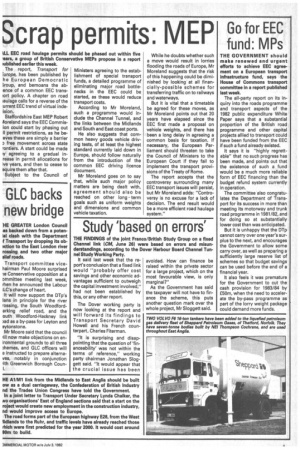Scrap permits: MEP
Page 5

If you've noticed an error in this article please click here to report it so we can fix it.
ILL EEC road haulage permits should ears, a group of British Conservative rublished earlier this week.
The report, Transport for Furope, has been published by he European Democratic iroup, and bemoans the abence of a common EEC transiort policy. A chapter on road iaulage calls for a reverse of the urrent EEC trend of virtual indeision.
Staffordshire East MEP Robert Oloreland says the EEC Commision could start by phasing out II permit restrictions, as he beeves these are simply a barrier ) free movement across state rontiers. A start could be made ly agreeing to a gradual inrease in permit allocations for lye years, and then to cease to equire them after that.
Subject to the Council of Ministers agreeing to the establishment of special transport funds, a detailed programme of eliminating major road bottlenecks in the EEC could be started, as these would reduce transport costs.
According to Mr Moreland, such a programme would include the Channel Tunnel, and the links between the Midlands and South and East coast ports.
He also suggests that common heavy goods vehicle driving tests, of at least the highest standard currently laid down in Europe, should follow naturally from the introduction of the common EEC driving licence document.
Mr Moreland goes on to say that, while such major policy matters are being dealt with, agreement should also be reached on other long -term goals such as uniform weights and dimensions and common vehicle taxation. While he doubts whether such a move would result in lorries flooding the roads of Europe, Mr Moreland suggests that the risk of this happening could be diminished by looking at all financially-possible schemes for transferring traffic on to railways and waterways.
But it is vital that a timetable be agreed for these moves, as Mr Moreland points out that 20 years have elapsed since the EEC first made a proposal on vehicle weights, and there has been a long delay in agreeing a common basis for taxation. If necessary, the European Parliament should threaten to take the Council of Ministers to the European Court if they fail to implement the transport provisions of the Treaty of Rome.
The report accepts that the controversy surrounding many EEC transport issues will persist, but Mr Moreland adds: "Controversy is no excuse for a lack of decision. The end result would be a more efficient road haulage system."








































